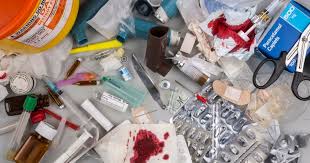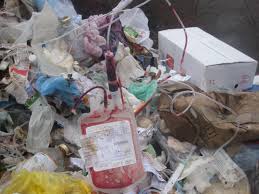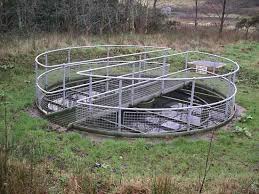Effects of Biomedical Waste on Health
Modernization and progress has had its share of disadvantages and one of the main aspects of concern is the pollution it is causing to the earth be it land, air, and water.
With increase in the global population and the rising demand for food and other essentials, there has been a rise in the amount of waste being generated daily by each household.
This waste is ultimately thrown into municipal waste collection centres from where it is collected by the area municipalities to be further thrown into the landfills and dumps.
However, either due to resource crunch or inefficient infrastructure, not all of this waste gets collected and transported to the final dumpsites. If at this stage the management and disposal is improperly done, it can cause serious impacts on health and problems to the surrounding environment.
Waste that is not properly managed, especially excreta and other liquid and solid waste from households and the community, are a serious health hazard and lead to the spread of infectious diseases.
Read Also: Guiding Principles of Integrated Biomedical Waste Management
Unattended waste lying around attracts flies, rats, and other creatures that in turn spread disease. Normally it is the wet waste that decomposes and releases a bad odor. This leads to unhygienic conditions and thereby to a rise in the health problems. Plastic waste is another cause for ill health.
Thus excessive biomedical waste that is generated should be controlled by taking certain preventive measures.
The group at risk from the unscientific disposal of biomedical waste include – the population in areas where there is no proper waste disposal method, especially the pre-school children; waste workers; and workers in facilities producing toxic and infectious material.
Other high-risk group includes population living close to a waste dump and those, whose water supply has become contaminated either due to waste dumping or leakage from landfill sites.

Uncollected biomedical waste also increases risk of injury, and infection. In particular, organic domestic waste poses a serious threat, since they ferment, creating conditions favorable to the survival and growth of microbial pathogens. Direct handling of biomedical waste can result in various types of infectious and chronic diseases with the waste workers and the rag pickers being the most vulnerable.
Exposure to hazardous waste can affect human health, children being more vulnerable to these pollutants. In fact, direct exposure can lead to diseases through chemical exposure as the release of chemical waste into the environment leads to chemical poisoning.
Many studies have been carried out in various parts of the world to establish a connection between health and hazardous waste. Waste from agriculture and industries can also cause serious health risks. Other than this, co-disposal of industrial hazardous waste with municipal waste can expose people to chemical and radioactive hazards.
Uncollected solid waste can also obstruct storm water runoff, resulting in the forming of stagnant water bodies that become the breeding ground of disease. Waste dumped near a water source also causes contamination of the water body or the ground water source.
Waste dumping in rivers, seas, and lakes results in the accumulation of toxic substances in the food chain of these areas. Through the plants and animals that feed on it directly or indirectly.
Disposal of hospital and other medical waste requires special attention since this can create major health hazards. This waste generated from the hospitals, health care centres, medical laboratories, and research centres such as discarded syringe needles, bandages, swabs, plasters, and other types of infectious waste are often disposed with the regular non-infectious waste.
Waste treatment and disposal sites can also create health hazards for the neighborhood. Improperly operated incineration plants cause air pollution and improperly managed and designed landfills attract all types of insects and rodents that spread disease. Ideally, these sites should be located at a safe distance from all human settlement. Landfill sites should be well lined and walled to ensure that there is no leakage into the nearby ground water sources.
Recycling too carries health risks if proper precautions are not taken.
Workers working with waste containing chemical and metals may experience toxic exposure. Disposal of health-care wastes require special attention since it can create major health hazards, such as hepatitis B and C, through wounds caused by discarded syringes.
Rag pickers and others, who are involved in scavenging in the waste dumps for items that can be recycled, may sustain injuries and come into direct contact with these infectious items.
Specific Effects of Biomedical Waste on Human Health
Poor biomedical waste management can pose a serious risk to human health.
The improper management of solid wastes represents a source of environmental pollution, and poses risks to human health. Below are some effects of biomedical waste on human health.
Read Also: Biomedical Waste Transfer Transport
Spread of vector borne-diseases-Poor disposal of biomedical waste is associated with spread of vector borne-diseases like malaria and dengue fever.
Malaria accounts for an estimated 300-500 million cases globally; which is an endemic disease in sub-Saharan Africa. It accounts for about 1.5-2.5 million deaths yearly, most of them among children under five years.
Respiratory diseases-Inhalation of poisonous chemicals can cause serious danger to human health. Chemicals inhaled may cause catarrh, cough, and bronchitis and may aggravate some health conditions such as asthma.
Incineration of biomedical waste contributes to air pollution by the release of gases into the air, which may cause ill-health. Malfunctioning incinerator can also cause fire outbreak.
Breeding ground for pest of public health importance decomposing organic materials can become breeding sites for pests, rats, flies and vermin that enhance the likelihood of disease transmission like diarrhea and Lassa fever.
Lassa fever for example is a hemorrhagic fever common in four African countries: Guinea, Liberia, Nigeria and Sierra Leone. It is transmitted to humans from contacts with food or household items contaminated with rodent excreta.
Flooding to health risks-indiscriminate dumping of wastes in the streets can block water drains and channels which can cause flooding, posing significant environmental and public health risks.
Water pollution can occur when rain water combines with decomposing waste and seep through permeable soil, finally contaminating surface and ground water with both lethal materials and pathogenic organisms; this is extremely dangerous as ground water is the main source of drinking water for most people in Nigeria for example.
Low birth weight- children of women exposed to hazardous solid waste materials may have low weight at birth.
Cancer- biomedical waste containing carcinogenic materials can pose danger to human health. Biomedical waste materials such as polyethylene may emit carcinogens during combustion and anybody expose to it will be at risk.
Congenital malformations-congenital malformations may occur as a result of exposure by pregnant women to some toxic constituents known as teratogens in biomedical waste.
Increase in neurological disease- biomedical waste may also impart negatively on human health by increase in neurological diseases due to handling of bulky materials
Nausea and vomiting-obnoxious odors emanating from indiscriminate waste disposal sites may cause nausea and vomiting to humans.
Increase in hospitalization- biomedical waste containing hazardous materials if not properly managed may results toxicity to people that may be exposed to it leading to increased hospitalization especially of vulnerable people e.g. of diabetic residents living near hazard waste sites.
Mercury toxicity-toxicity may occur as a result of consumption of fish containing high level of heavy metals such as mercury leading to mercury poisoning.
Accidents- improper disposal biomedical wastes may lead to accidents on road causing loss of human lives and economic properties.


